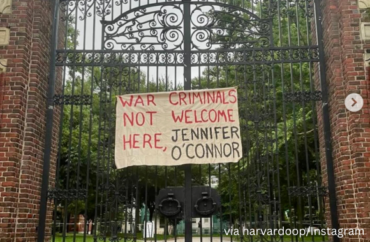
‘Universities must help students to shed bad habits, like desiring victory … instead of a shared pursuit of truth’
Harvard University has begun asking prospective students to recall a time when they strongly disagreed with someone as the institution works to improve civil discourse.
The new application question was added this year amid widespread concerns about the erosion of open, constructive debate on college campuses.
But scholars told The College Fix it’s going to take more time and effort to improve the situation.
The essay question asks, “Describe a time when you strongly disagreed with someone about an idea or issue. How did you communicate or engage with this person? What did you learn from this experience?”
Harvard’s undergraduate application includes five short prompts that prospective students are required to answer in 150 words or less, according to its website. Others ask students to describe “extracurricular activities, employment experience, travel, or family responsibilities that have shaped who you are” or name the “top 3 things your roommates might like to know about you.”
When asked about the new question, Harvard spokesperson Jonathan Palumbo told The College Fix in a recent email the university reviews its application annually and makes “adjustments to ensure we are providing candidates with the best opportunity to represent themselves through the materials.”
Yale, Brown, and Princeton have similar admissions questions about disagreement.
MORE: Harvard, Columbia, Penn top list of worst universities for free speech: survey
While the new essay question may be a step in the right direction, Matthew Berry of the University of Dallas politics department said civil disagreement is a skill to be acquired over time.
Berry told The Fix in a recent email that constructive dialogue among students begins “by first fostering student disagreement about lower stakes things.”
For example, discussions could start with issues about Athens and Sparta where “there isn’t any immediate relevance to American life so the issues aren’t so fraught with personal attachment,” the professor said.
“That sort of thing helps us acquire good habits, including habits of rational conversation, and to begin to shed bad habits, like desiring victory or vindication in a conversation instead of a shared pursuit of truth,” Berry told The Fix.
Harvard and other campuses across the country experienced unrest throughout the past school year, much of it related to Hamas’ attack on Israel on Oct. 7. The Fix’s Cancel Culture Database records events where pro-Palestinian students disrupted spring commencement ceremonies and fall orientation events, and pro-Israel guest speakers and events were canceled.
American Council of Trustees and Alumni fellow Steven McGuire pointed to last year’s “turmoil” – and anticipation of “more of the same this year” – when contacted by The Fix about the new application question.
“I hope Harvard has added this question because it recognizes the need to reform its admissions process to select for students who are ready to engage in inquiry and debate rather than sloganeering and aggressive activism,” McGuire said.
He said universities should consider prospective students’ “readiness to engage in wide-ranging discussions and debates with people who have different ideas than their own.”
The new essay question also comes after Harvard leaders announced a position of institutional neutrality in May, stating it will no longer comment on “issues outside its core function.”
Harvard also launched a Civil Discourse Initiative in December “to foster an environment of curiosity, ambition, mutual understanding and achievement,” the university website states.
McGuire told The Fix he hopes Harvard is recommitting itself to the mission of higher education.
“Adding an admissions essay prompt that asks prospective students to discuss how they have approached difficult conversations in the past seems like a fair way to gauge whether they are prepared to participate in the free exchange of ideas that is the lifeblood of the college experience,” McGuire said.
MORE: Meet Ohio State’s new ‘intellectual diversity’ center director
IMAGE: harvardoop/Instagram
Like The College Fix on Facebook / Follow us on Twitter






Please join the conversation about our stories on Facebook, Twitter, Instagram, Reddit, MeWe, Rumble, Gab, Minds and Gettr.